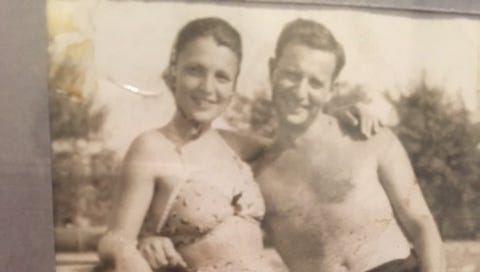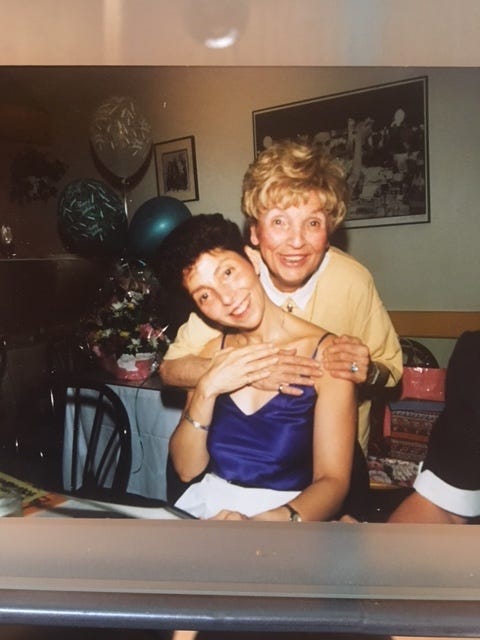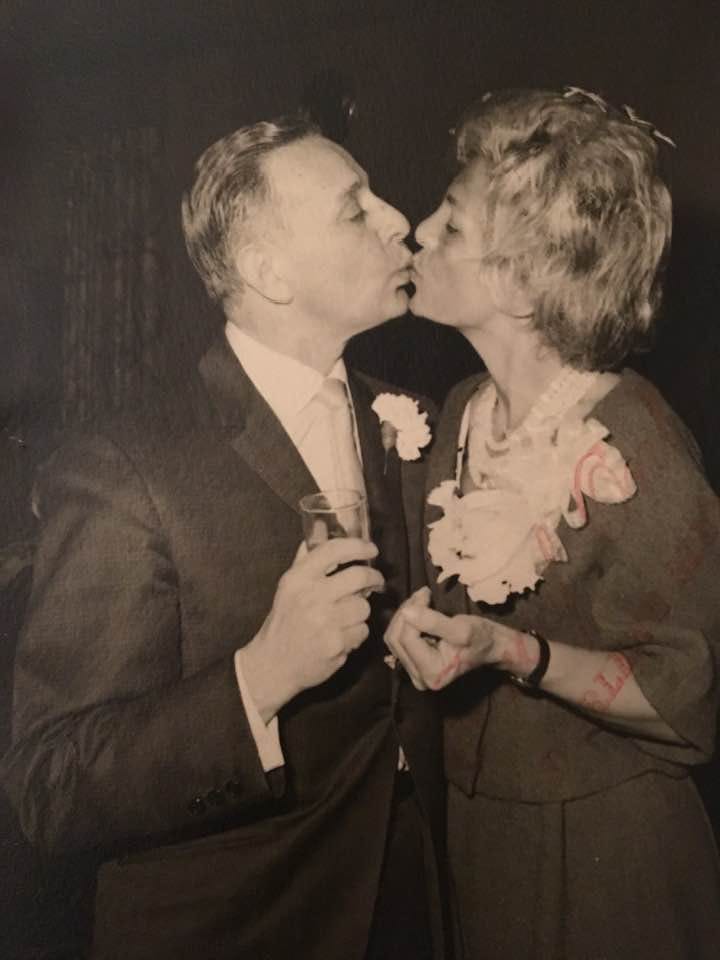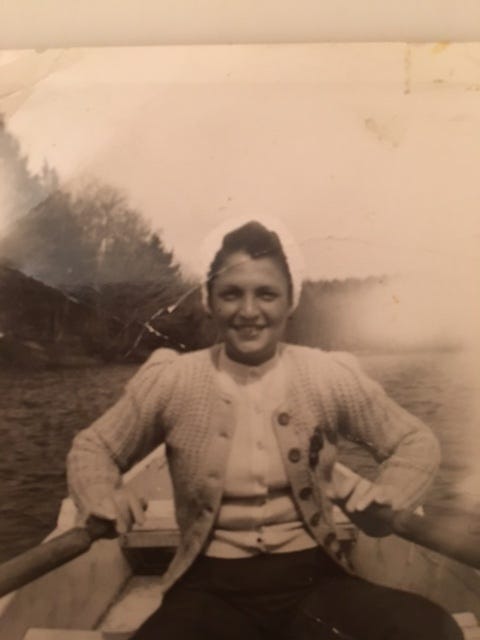I have better conversations with people who have been dead a long time than with the recently dead. The recently dead are still too much themselves, and it’s harder to invent their dialogue. The person I like talking to the best who is dead is my mother. She isn’t the longest dead. She’s the most alive dead. She has never stopped talking. The longer she is dead, the more I sound like her.
I like looking at her face in profile as we ride together on the bus. She’s sitting in the window seat. She doesn’t want people to bop her on the head with a backpack. Why are we riding the bus instead of taking a subway? No one knows. Why are we riding a bus instead of walking? She’s at the age where she takes a bus in at least one direction. Why is she this age? So I can study her. I’m nearing her age. I would still not take a bus.
She walked miles well into her 80s. Then she had the emergency triple bypass operation at 89 that caused a stroke. Then she lived another three years, needing 24-hour aides. This is not the Toby I talk to. The Toby I talk to is still on the streets, and I have no idea what is going on in her mind. I never have. This hurts her feelings in some way I can’t put my finger on, or it doesn’t hurt her feelings and she doesn’t care. Maybe she thinks because I came out of her body, I should have spent some time in there listening to her and looking for clues.
The thing about writing is you need to stay in the unknowing place as long as possible. It’s not a real sense of not knowing things. It’s a fake sense of not knowing things. It’s a show you put on for the reader, so they won’t think you are a know-it-all, a smarty pants, a show off. These are traits my mother would have said are true of me. I agree. She wasn’t sure where she stood with the traits. My father was the one to say to her, “Tobe, this kid has brains.” That’s the family story. In my mother’s version of the story, she says to my father, “She does?”
My mother once told me, “I don’t tell you enough the things you want me to tell you. I wasn’t brought up that way. It was giving a kinahora (keyn aynhoreh, Yiddish phrase meaning "no evil eye.") to give too much praise.” In my version of this conversation, she says, “But I think it. I want you to know that.” I say, “Thanks, Mom.”
On the bus, her profile is beautiful. Her cheeks are soft. She wears a little blush. Where does she get this blush? I have never seen her apply makeup. Isn’t that weird? One day she said to me, “You look good, kinahora. You look thirty. How is that possible?” I was in my fifties. I said, “I had a facelift, Ma.” She said, “Who believes you would ever do such a thing.”
This is an interesting phrase, “Who believes you would ever do such a thing?” How do you read it? I read it my mother likes to live in the reality she’s invented, and I do exactly the same thing. We do not want to believe a thing can be, even though the thing is staring us in the face. We prefer to stick with not believing it. In this way, we are certain of ourselves, even when we know we are mistaken. In this way, we remain in the knowing place rather than the unknowing place, and now you can see why, as a writer, I would have to invent a narrator who is more seemingly open to experience and a variety of possible interpretations than I actually am. You can see why I would have to invent a narrator who is neither me nor my mother.
I remember this walk we took along the beach in East Hampton. It was shortly after my father died, and Gardner and I had rented a place for a few months and invited her to stay with us. The thing that is striking in memory is that my father died in 1982, which means my mother, who was born in 1915, would have been only 67. She’s walking along the beach, and she seems lost, and I am trying to be kind to her and gentle with her, and I think this is a friendly walk with my dog beside us. She’s charmed by the way the dog sniffs at things. She says, “Sasha, that’s a dead fish. You don’t want to eat that.” She says, “Come to think of it, I feel like a dead fish. What’s the point of going on?” I say, “When Daddy was alive, you used to argue with him.” She says, “That’s how life is. Now, I miss him terribly.”
The same could be said about me and Toby. That’s how I’m reporting us on the beach. It was probably difficult for us to say anything that wouldn’t land on the other without a pinch. My mother and my sister, now, they could have had a walk that would have given my mother comfort and a sense of belonging. My mother liked Gardner. He was closer to her age than mine, and he had the smell on him of man, as in man to lean on.
If you want to know what my mother was really like, and maybe I am really like—although I hope not, but maybe, I’m no ruling it out—I’m going to tell you a story from after my mother had a stroke and went around the city in a wheelchair. In this story, Primrose is with us. Primrose was one of my mother’s aides, and they loved each other. Primrose is pushing Toby into the Time Warner Center at Columbus Circle, and I am telling her about Richard. We’re pretty new at this stage, maybe into our relationship a few months, and I’m telling her about what Richard does and where he lives, and she says, in a kind of dreamy, Mad Hatter voice, “Oh, he’s a poor slob.”
I never forgave her. Years later, she apologized for saying that. Primrose explained to her what was wrong with saying this to me. I told Richard about the phrase. He looked it up. It was a throw-away phrase people used in my mother’s day for people like the ones she came from, people who were all poor slobs, nebbishes and never going anywhere people, not necessarily a mean phrase, but certainly not encouraging. The opposite of encouraging. Encouraging would have been a kinahora, perhaps in her mind, although I doubt it.
I cannot exactly tell you now why the phrase went into me the way it did. In one sense, I thought she was saying I was a poor slob and I would never do better in life than attracting other poor slobs because how would anything other than that be possible? I suppose I have always felt I was a poor slob at some level. Maybe everyone has moments when they feel this way.
I think the thing about my life my mother would have wanted for herself, and maybe the only thing, was my freedom to try things and possibly fail. She said, “We sent you kids to camp because we didn’t want you to be afraid of anything.” She said, “We didn’t expect our kids to do things around the house, because we wanted children to be children. You didn’t ask to be brought into the world.”
She didn’t think I was much of a writer, although she was a little bit interested that other people thought I was. One day, on a bus, she met a young woman, and they got to talking, and the woman said to her, “You’re Laurie Stone’s mother?” When my mother reported this conversation, she said, “I think she was surprised. I think she thought I wasn’t smart enough to be your mother.”
______________________________________________________
Biz
There is no paywall. There will never be a paywall.
Please take a turn at a paid subscription, for a month or a year.
Fantastic new benefits that include guest writers and artists at monthly Zoom Conversations at no extra charge, the first one is
on SATURDAY JUNE 28 from 3 to 4 EST. Upcoming guests include: Margo Jefferson, Elizabeth Kendall, Emer Martin, and Daisy Alioto (founder of the media “empire” Dirt.____________________________________________________________
Prompty people
We tried this prompt at our last writing workshop, and you can try it too. Ten people wrote ten very different pieces, and yet they created some kind of beautiful wholeness together. PLEASE ENJOY THE EXERCISE AND PLEASE DON’T POST YOUR WRITES IN THE COMMENT SECTION.
This prompt has several ingredients, like the cooking show Chopped, where cooks have to prepare a dish from a basket of disparate food items.
During your 30-minute write, include as many of these elements as possible and that work for the direction your piece decides it’s heading:
Include a chunk of dialogue that can be said in the moment, can be overheard, or can be remembered . . . the dialogue does not have to include the narrator as one of the speakers. In the chunk of dialogue, have the partners speak at least two times each, ie She said and then they said, and then she said and then they said.
Chose one of these settings: a diner, a train, an open pasture with animals, an island with a volcano.
Incorporate as many of these words as you can into your narrative, monologue, poem, prose poem, play, or whatever form you decide to write in: pink, chimney, itch, sunglasses, blueberry, leathery, windblown, squat, suddenly, tick, velvet, meanwhile, splint, marble.
______________________________________________________
Happenings for paid subscribers.
The next Zoom Conversation
features guest writer
and is on SATURDAY June 28 from 3 to 4 EST. To RSVP, please email me at: lauriestone@substack.comA quick way to lend one-time support and attend the next Zoom is to tip your server with a $4 coffee: ko-fi.com/lauriestone
The Next Breakout Conversation
Is Sunday June 29 from 3 to 4 EST, where you can speak about a project you are working on and receive feedback, please email me at: lauriestone@substack.com. There is a cap of 10 participants and an additional cost of $30.
To request a recording of the last Zoom Conversation on May 31
Please email me at: lauriestone@substack.com
Working together one to one
If you would like to book time to talk one-on-one about a project you are working on or for guidance in gaining confidence and freedom in your writing, please email me at: lauriestone@substack.com.
If you would like to book time to talk one-on-one about STARTING AND GROWING a Substack publication please email me at: lauriestone@substack.com. I can help you through the software and approaches to gaining readers.









I'm happy you and your mother are finally getting on, it's taken quite a bit of writing. Love, your poor slob. XX
Oh this is so wonderful, especially for those of us who had primarily conflicted relationships with our difficult mothers. Mine has been gone a long time. It has always been hard for me to praise her or to see her in a positive light. That is an act of generosity I can not seem to manage. I tried to write a piece imagining us as mother and adult daughter of indeterminate ages, having tea in a Paris department store and looking at scarves (something she would have relished.) The piece was dead. Inert. I could not imagine--or give life to-- a scenario in which I enjoyed her company. So congratulations to you on making Toby vivid to us.